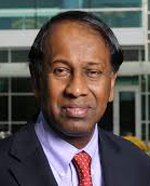Lankan prof honoured by American Association for Thoracic Surgery

Dr. Ajit Yoganathan
Dr. Ajit Yoganathan was in the limelight of both engineering and medicine this year, when the American Association for Thoracic Surgery (AATS) named the acclaimed Sri Lankan-born biomedical engineer their first honorary fellow.
He is the first recipient of an award tailormade to recognize persons who are not cardiothoracic surgeons but have made contributions to the fields of cardiac or thoracic surgery.
Dr. Yoganathan who lives in Atlanta, is a Member National Academy of Engineering and Emeritus Regents’ Professor & Wallace H. Coulter Distinguished Faculty Chair in Biomedical Engineering at The Georgia Institute of Technology.
He can wear the new laurels with ease. One of the most distinguished Sri Lankans living in America, with his work at his Cardiovascular Fluid Mechanics Laboratory (CFM Lab) he has saved countless lives.
He stands out for two achievements particularly- inventing the science of prosthetic heart valve engineering, and planning software for difficult cardiac surgeries in babies with deadly birth defects.
Dr Yoganathan hails from a medical family, with a busy GP father and his mother a professor in pathology, whom he would accompany to lectures and sit swinging his legs on the benches at the University of Ceylon (Colombo).
After his schooling at Royal College, and graduating from the University of London having studied chemical engineering, he moved to the California Institute of Technology (Caltech) in 1973 where he was to do his PhD. Here he first heard his professor, William Corcoran, speak about his work researching blood flow.
That engineering could serve medical ends and help save lives simply fascinated him. There was to be no turning back from that point.
‘Translational Medicine’ is the term for what Dr. Yoganathan has been advocating for four decades now- to translate science and engineering directly into patient benefit.
His reputation as the preeminent expert on replacement heart valve design blossomed in the late ‘70s. He had always been interested in heart valves, and soon his lab (the CFM) began working with the U.S. Food and Drug Administration (FDA) to “come up with the initial standards for valves and test protocols at the lab bench.”
Until then there had been no official lab testing procedures and no required preclinical or clinical trials for mechanical valves. New heart valve designs were implanted straight into patients with no testing, meaning that sometimes as much as a dozen valves could fail till a successful one was put in.
This was such a tricky situation because the physics of blood flow can be elusive, varying from patient to patient and with effects of hypertension and other diseases.
“Dr. Y’s overarching contribution was to end the guesswork (of mechanical valves)”, states a glowing tribute in Horizons, the magazine of the Georgia Institute of Technology.
Also, much of the credit for inventing the transcatheter valve goes to Dr. Yoganathan. This arterial catheter guides a prosthetic valve in a collapsed state through an artery to the heart, where a balloon expands the valve to replace the damaged natural valve, or to correct a narrowing in the aorta. This has saved thousands of patients for whom open heart surgery was too risky.
His achievements in paediatric cardiac surgery- argued by paediatric surgeons to be more groundbreaking than work with valves- were made via cardiovascular knowledge with years of flow and physiology data gathered with ultrasound and magnetic resonance imaging, modeling, and computer simulation.
In previous cardiac surgeries of babies with potentially fatal birth defects, there was the same trial-and-error method as with valves. It was Dr. Yoganathan who pointed out ways to predict what surgery would do to blood flow- meaning there would be no more risky experiments on babies.
He also isolated one heart defect- where two out of a 1000 American babies are born with only one ventricle in the heart- and was able through work done with them at low cost, to develop a new software.
Created with the expertise of Jarek Rossignac, a professor in Georgia Tech’s College of Computing, the software enables surgeons to get patient-specific surgical solutions based on the anatomy and physiology of the individual.
It was all this work that facilitated his 2015 induction into the National Academy of Engineering; the second Sri Lankan to be given the highest honour for engineering achievement in the States.
After retiring in June this year, Dr Yoganathan continues to work at Georgia Tech to run his groundbreaking Structural Heart Research Program. He has ensured that a talented group trained under him- including more than 50 Ph.D. students and as many master’s graduates- will continue his legacy of translational cardiology.


